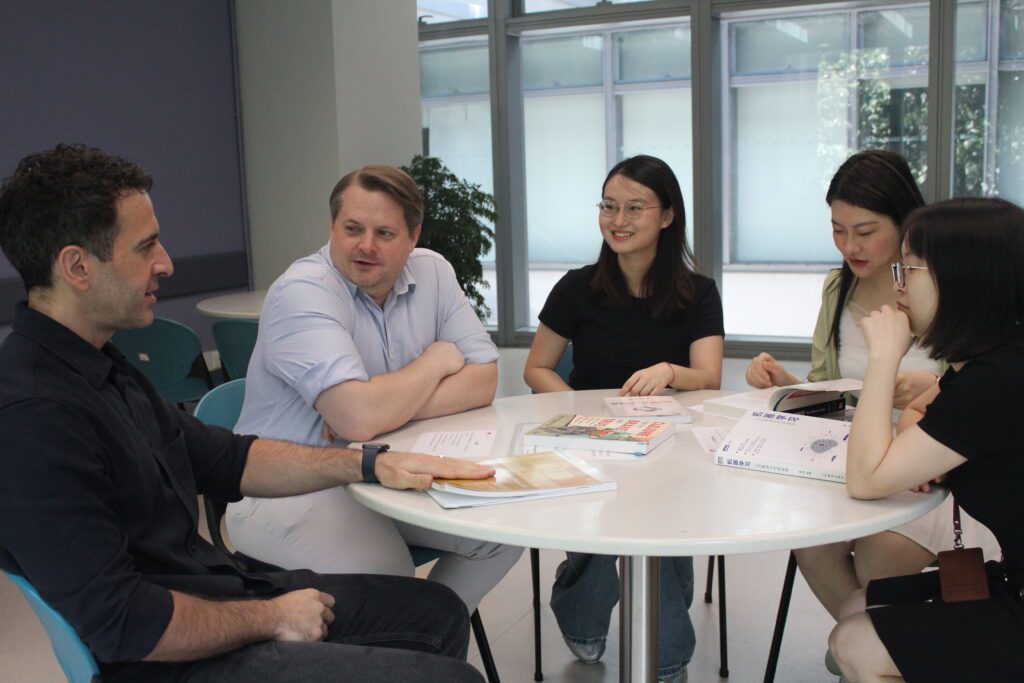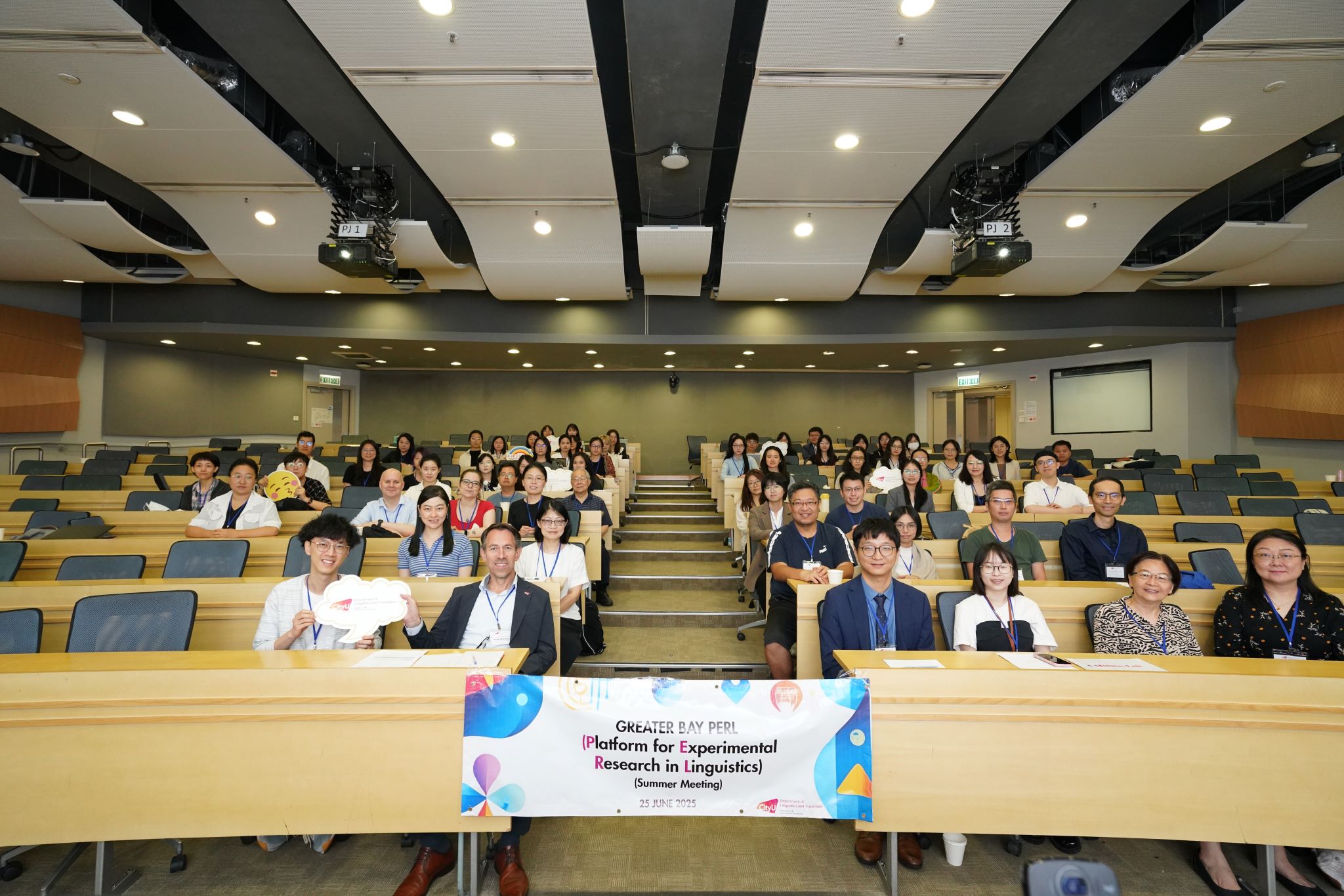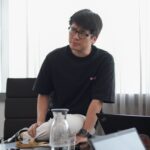An education at the Department of Linguistics and Translation at City University of Hong Kong (LT, CityUHK) is rich, interdisciplinary, and links theory to the real world. In 2025, its curriculum reflects the dynamic evolution of language research in the digital and cognitive age. This is, after all, a department distinguished for its strengths in computational linguistics, psycholinguistics, and neurolinguistics – the latter notably advanced by Prof. Ashley G. Lewis, an expert in electroencephalography (EEG) and magnetoencephalography (MEG).
What that means is he studies the electrical chatter and magnetic “fingerprints” of human brains and ties it to his research at LT, CityUHK. Working with colleagues (Prof. Niels O. Schiller, Prof. Aini Li, and Dr. Jiaqi Wang) and students, Prof. Lewis is investigating how bilingual or multilingual (Cantonese-English-Mandarin) speakers switch between languages, how people deal with structural ambiguity while reading complex sentences, and the degree to which inflectional morphology (adding little bits to a word to mark grammatical information about the word or change its meaning, like adding “-s” to “cat” to make “cats”) plays an important role in speech production by Chinese speakers using English, among other projects.
“Ongoing international collaborations include work using neuropharmacology to study how dopamine levels in the brain influence structural ambiguity processing during reading, work using virtual reality to study how people integrate the perspective of a virtual agent when interpreting utterances in conversation, and work investigating the role of prediction when the reliability of visual input is compromised during reading,” he adds.
With such experts and research, earning a Master of Arts in Language Studies (MALS) here becomes a world-class endeavour. The environment is innovative and unhesitating in crossing disciplines. Scholarship is cutting-edge and often transformed into real-world impact. These are must-haves for anyone seeking to explore their interests and prepare for career paths in General Linguistics, Corpus and Empirical Linguistics, Pedagogical Linguistics, Translation and Interpretation, or a combination of several.
As specialised streams in the MALS programme, each sharpens your intellectual skills while fostering hands-on capabilities. Like LT, CityUHK’s expert faculty, you’ll learn to address complex language issues in education, technology, and society, both locally and globally.
Ray Hui, an MALS student, has seen his understanding of language “transformed significantly” since joining. He still remembers a cognition and language acquisition course taken in his first year that left a lasting impression. The professor’s research, which often involved her trilingual child, showcased how first-language knowledge can scaffold the acquisition of second or third languages. Through corpus data and classroom discourse, Hui began to see the strategic use of code-switching and code-mixing not as weaknesses but as cognitive tools learners use to navigate multiple languages.
“This insight reshaped how I view bilingualism. I became more confident using English in various settings and less self-conscious about switching between languages,” he says. “The programme has broadened my perspective, showing that language is fluid, functional, and deeply human — and that scientific tools like corpus analysis and experimental design can help us understand its complexity with greater clarity.”
The department ranks 38th globally for Linguistics, according to the 2025 QS World University Rankings by Subject. This strong showing is a testament to the department’s reputation among academics and employers, its productivity and impact, research citations per paper, and international research network.
For Ting Wai Ying, the MALS programme changed how she understood language and the brain, while also giving her practical tools to study them — especially in areas like natural language processing.
“We used Sketch Engine to search for collocations and word distribution, and we used Python to generate sentences and perform grammar checks,” she says. “We used command codes to calculate types and tokens. We also learned how electroencephalography and functional magnetic resonance imaging can be helpful to investigate human brain activity relating to language comprehension and production.”

Research is a shared pursuit here, rooted in a culture of collaboration. Source: City University of Hong Kong
But for all its use of advanced tools and methods, the department aims to strike a careful balance between scientific rigour and the reflective power of the humanities. “No doubt, quantitative skills and digital literacy will be crucial for younger generations moving forward,” says Prof. Lewis. “The scientific approaches to studying language that are offered by our department provide skills that extend beyond just the study of language to fulfil this growing need.”
One person who thrives on this synergy between linguistic science and digital innovation is Postdoctoral Fellow Dr. Yushu Wu. After completing her PhD from CityUHK, Dr. Wu chose to stay on to deepen her research, which centres on both corpus-based and empirical analysis.
She develops the Hong Kong Corpus of Chinese Sentence and Passage Reading, a large-scale eye-tracking dataset designed to study Chinese reading behaviour.
“By examining eye movement patterns, such as fixation durations and saccades, I investigate cognitive processes in reading,” she says. “This work supports the department’s experimental linguistics research line, which aims to deepen understanding of language processing through the integration of eye-tracking trajectories with physiological signals, such as EEG and fMRI, fostering interdisciplinary insights into language science.”
Dr. Wu guides students and junior researchers through training in eye-tracking, EEG, and phonetics as they work on their theses too. “The department supports this process with access to advanced tools like eye-trackers and statistical software, creating a collaborative environment where students can develop robust research skills and contribute meaningfully,” she says.
Learn more about the Department of Linguistics and Translation at City University of Hong Kong.











